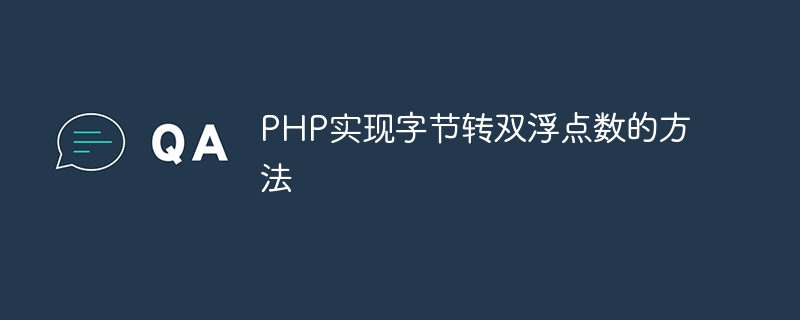Home >Backend Development >PHP Tutorial >How to convert bytes to double floating point numbers in PHP
How to convert bytes to double floating point numbers in PHP
- WBOYWBOYWBOYWBOYWBOYWBOYWBOYWBOYWBOYWBOYWBOYWBOYWBOriginal
- 2024-03-07 14:12:03650browse

PHP method to convert bytes into double floating point numbers
In programming, sometimes we need to convert bytes into double precision floating point numbers Points. In PHP, we can achieve this conversion through certain methods. The following will introduce specific code examples to implement the method of converting bytes to double floating point numbers.
First of all, it needs to be made clear that in computers, double-precision floating point numbers are represented by 64 bits, including 1 sign bit, 11 exponent bits, and 52 mantissa bits. Therefore, we need to reassemble the bytes into the form of a 64-bit double precision floating point number.
Here is an example of a PHP function that converts bytes to double precision floating point numbers:
<?php
function bytesToDouble($bytes) {
$double = unpack("d", $bytes); // 使用unpack函数将字节转换为双精度浮点数
return $double[1]; // 返回转换后的双精度浮点数
}
// 测试代码
$doubleNumber = bytesToDouble($bytes);
echo "转换后的双精度浮点数为:".$doubleNumber;
?>In the above code, we define a function called bytesToDouble A function that accepts a string containing bytes as an argument and uses the unpack function to convert the bytes to a double precision floating point number. Finally, we verify the correctness of the function by testing the code.
It should be noted that when using this method, you need to ensure that the input bytes meet the format requirements of double-precision floating point numbers, otherwise it may cause conversion errors.
Through the above code example, we can easily convert bytes to double-precision floating point numbers. This may be helpful in some applications that need to handle binary data.
The above is the detailed content of How to convert bytes to double floating point numbers in PHP. For more information, please follow other related articles on the PHP Chinese website!

